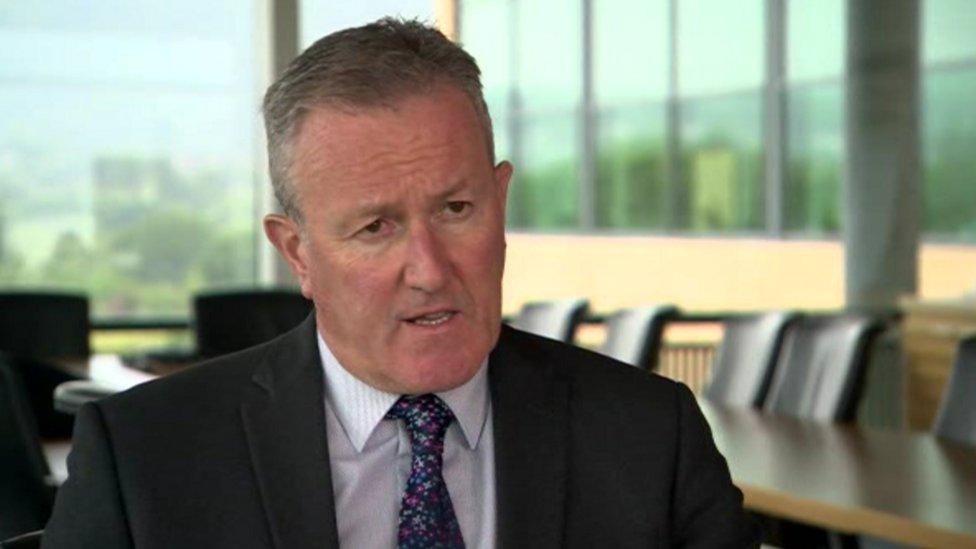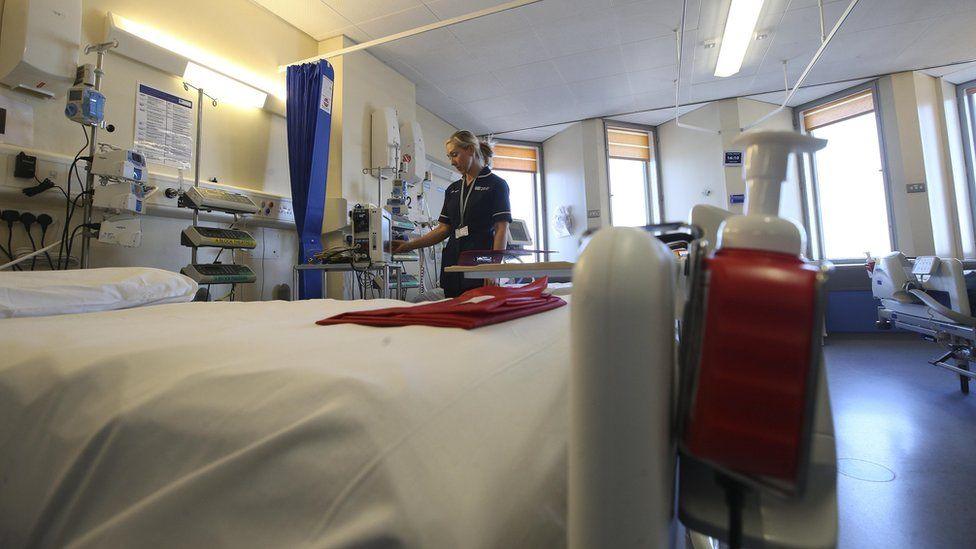NI waiting lists: Stormont reallocates £30m to tackle issue
- Published

The Stormont Executive is to divert funding of more than £30m in a bid to tackle Northern Ireland's growing waiting lists.
The move is part of a reallocation exercise known as a monitoring round.
It will also see extra funding of £10.7m diverted to the Department of Health to cope with pharmaceutical pressures linked to Brexit.
Finance Minister Conor Murphy presented details of his proposed June monitoring round at Thursday's executive meeting.
Other reallocations include £19m to the Executive Office to pay first-year costs of the Troubles compensation scheme, in which money will go to eligible victims and survivors of the conflict.
Mr Murphy said long-term funding for the scheme would continue to be discussed with the Treasury.
The Department of Education is also in line for almost £36m to provide additional support for children with special educational needs (SEN).
Other allocations include:
£39m to the Department for Communities, including urban renewable programmes funding and property adaptions for tenants living with disabilities
£19.7m to the Department for Infrastructure for roads maintenance and NI Water
£11.5m to the Department of Justice for legal service and PSNI protocol costs
£3.5m for the Central Government Transformation Programme and IT costs across departments
£0.9m for the Department for the Economy for Tourism NI
'Financial wrangle'
Mr Murphy said the detail of what areas in elective care the funding will be allocated to "is a matter for the health department".
He said a long-term strategy for investment will require "very substantial intervention over a long number of years".

Finance Minister Conor Murphy said a long-term strategy for investment will require "very substantial intervention"
He added that the Troubles compensation scheme is due to open in July after a slight delay.
"We haven't yet resolved the issue of who's responsible for the scheme, who pays for the scheme, that dialogue is ongoing and I hope to resolve that in the not-so-distant future," he said.
He said the money would go directly to those applying for the scheme "so victims won't have to wait further".
"It was never our desire to get into a financial wrangle over this but the British government changed the scheme substantially and handed the cost over to the executive and we've been having dialogue ever since."
'Too long for treatment'
In recent weeks, it has emerged that some people are waiting seven years for medical procedures in Northern Ireland.
The latest waiting list figures, from January to March 2021, indicated that:
More than 335,000 people were waiting for a first consultant-led appointment
More than 189,000 people had been waiting longer than a year for a first outpatient appointment
The departmental target is that at least half of all patients should wait no longer than nine weeks for a first appointment and no-one should wait longer than 52 weeks.
It prompted Health Minister Robin Swann to suggest the size of Northern Ireland's waiting lists was "undermining" the principle of a free health service.
He had previously said it could take up to 10 years to tackle the issue and that many people were waiting "too long for treatment".
Northern Ireland has the worst waiting times of any UK region, with problems exacerbated by the restructuring of the health service to deal with the Covid-19 pandemic.
'A far cry from what is needed'
Mr Swann said the additional waiting list funding will go towards areas including physiotherapy, occupational therapy, speech and language therapy and psychological therapies.
"This will be in addition to our ongoing investment in elective care for the highest priority cases in terms of clinical need," Mr Swann said.
"While additional one-off allocations will always be welcome, a long-term solution to waiting lists requires sustained and guaranteed funding over a number of years."
Other health allocations also include £4.5m for Muckamore Abbey Hospital support costs, including funding for the alternative location of patients who might previously have been treated at Muckamore, £1m for cyber security and £11.5m capital funding.
SDLP leader Colum Eastwood said "£31.5m is welcome but it is a far cry from what is needed.
"The truth is that this is not simply a waiting list issue; it represents a serious collapse in health services for far too many people who have been told that they have to wait for years for elective care that will improve their quality of life."
"What we need is a longer-term strategic resource plan to deal with this crisis.
"The Department of Health and Royal College of Surgeons have identified £1bn is needed over the next five years to address waiting times alone.
"That critical resource needs to be accompanied by a strong political agreement to transform our health service so that patients can access treatment at the point of need."
Education Minister Michelle McIlveen welcomed the funding for children with special educational needs "after an extremely challenging year for the education sector".
She said the money will be used "to deal with the pressures caused by Covid-19".
Ms McIlveen said the funding will "support pressures relating to special schools and specialist support in mainstream schools, SEN support services and SEN transport" and includes a further £8m to support implementation of the new special educational needs framework.
Related topics
- Published2 June 2021

- Published27 May 2021

- Published24 June 2021
